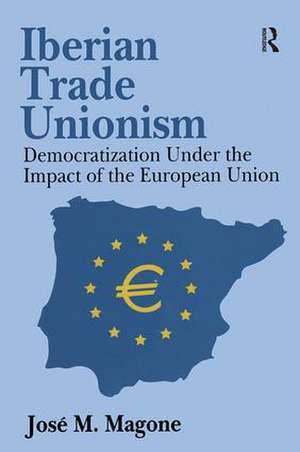Iberian Trade Unionism: Democratization Under the Impact of the European Union
Autor Jose Magoneen Limba Engleză Paperback – 6 feb 2018
Unlike most literature on the study of democratization and Europeanization, Iberian Trade Unionism aims to break the dominant focus on political parties and political institutions by raising awareness of the importance of interest groups such as trade union confederations in contributing to a strengthening of democratic governance.
The central thesis is that both Portuguese and Spanish trade unions are becoming increasingly part of a transnational European strategy which shapes the internal organizations toward professionalism and democratization. Part 1, "Gontextualizing Iberian Trade Union Strategies," deals with the operations of both Portuguese and Spanish trade union confederations. Part 2, "The National Systems of Interest Intermediation and Trade Union Confederation Strategies," analyzes the transformation of the national systems of intermediation in the 1990s which were affected by a decline in steering power of Spanish and Portuguese political systems vis-a-vis global and European political and economic processes. Part 3, "Subnational and Transnational Policies of Iberian Trade Union Confederations," deals with policies and strategies. The last chapter treats the integration of Iberian trade union confederations in the institutions of the European Union as well as the ITUCs and is based on original research done in Madrid, Lisbon, and Brussels.
This timely look at interest groups and lobbying in the European Union will appeal to scholars studying European integration and the role of interest groups in it, and to students of Spain, Portugal, or southern Europe.
Preț: 190.88 lei
Preț vechi: 230.80 lei
-17% Nou
Puncte Express: 286
Preț estimativ în valută:
36.53€ • 37.100$ • 30.16£
36.53€ • 37.100$ • 30.16£
Carte tipărită la comandă
Livrare economică 14-28 aprilie
Preluare comenzi: 021 569.72.76
Specificații
ISBN-13: 9781138510739
ISBN-10: 1138510734
Pagini: 352
Dimensiuni: 152 x 229 mm
Greutate: 0.45 kg
Ediția:1
Editura: Taylor & Francis
Colecția Routledge
Locul publicării:Oxford, United Kingdom
ISBN-10: 1138510734
Pagini: 352
Dimensiuni: 152 x 229 mm
Greutate: 0.45 kg
Ediția:1
Editura: Taylor & Francis
Colecția Routledge
Locul publicării:Oxford, United Kingdom
Cuprins
Introduction; 1: Contextualizing Iberian Trade Unionism; 1: The Modern World System and the Emergence of Regional Trading Blocks; 2: The Emergence of Multilevel Governance in the European Union and Interest Groups; 3: The Making of Social Europe; 4: The Changing Nature of European Trade Unionism; 2: National Systems of Interest Intermediation and Trade Union Confederation Strategies; 5: The System of Interest Intermediation of Portugal; 6: The Strategies of Portuguese Trade Unionism in the 1990s; 7: System of Interest Intermediation in Spain Since the 1970s; 8: The Strategies of Spanish Trade Unions in the 1990s; 3: Subnational and Transnational Policies of Iberian Trade Union Confederations; 9: Transborder Cooperation between Spain and Portugal: The Case of Trade Unions; 10: The Supranationalization of the Activities of the Iberian Trade Union Confederations: ETUC and the EU Institutional Framework; 11: Conclusions: Redesigning Iberian Trade Unionism
Descriere
One of the most neglected areas of the European integration process is the role that trade union confederations may play after the full establishment of the Economic and Monetary Union
